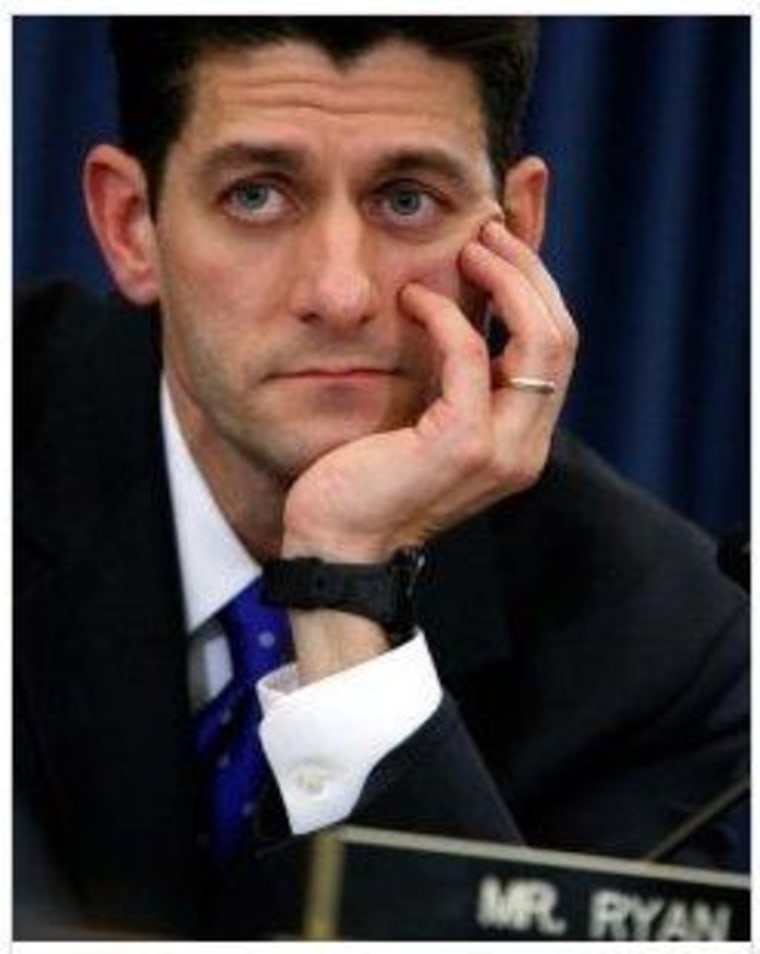House Budget Committee Chairman Paul Ryan (R-Wis.) seems quite fond of the phrase "bipartisan consensus." It's ironic, under the circumstances, but even putting that aside, to paraphrase Inigo Montoya, Ryan keeps using those words, but I do not think they mean what he thinks they mean.
Here's Ryan yesterday talking about his plan to end Medicare's guaranteed benefit: "I believe there is a bipartisan consensus emerging on going this direction."
Last week, he told the New York Times there's "a bipartisan consensus on most elements of what needs to be done" on the debt. A few days prior, Ryan told Fox News, "There's a bipartisan consensus on tax reform." A few days before that, Ryan told ABC "there is an emerging Democrat-Republican bipartisan consensus" on closing tax loopholes. A day before that, he told CNN his Medicare reforms "reflect the emerging bipartisan consensus."
In March, Ryan told CBS there's "a bipartisan consensus" to get rid of tax shelters. In February, he said on NBC's "Meet the Press" that "a bipartisan consensus" exists on tax policy.
You get the idea.
I'm sure it's the kind of language that makes unwitting media figures swoon -- "Paul Ryan can't be a radical; he keeps talking about his love for bipartisan consensus!" -- but let's unwrap this a bit, because I think it's important to understand how wrong the Ayn Rand acolyte really is.
First, when Ryan's far-right budget plan reached the House floor, it garnered exactly zero Democratic votes, and generated opposition from 10 House Republicans. This isn't an agenda that enjoys "bipartisan consensus"; it's the exact opposite.
Second, there's ample polling data to suggest there is a "bipartisan consensus" among Americans on all kinds of compelling ideas: tax fairness for the wealthy, increased investments in domestic infrastructure, health care reforms that protect those with pre-existing conditions, keeping Medicare and Social Security intact, etc. Paul Ryan opposes all of these measures, regardless of their overwhelming support from the electorate.
Third, there's arguably a legitimate "bipartisan consensus" on some of these issues in a broad sense -- both sides agree that Medicare faces serious fiscal challenges and tax reform is doable with the elimination of various loopholes and tax expenditures -- but Ryan's hard-line privatization agenda enjoys almost no Democratic support, and tax reform is impossible so long as Ryan touts closing loopholes without actually going to the trouble of saying which ones he'd scrap.
And finally, "bipartisan consensus" just isn't what it used to be. It wasn't too long ago that Democrats and Republicans agreed on a health care mandate, the basic structure of an immigration reform package, a cap-and-trade plan, contraception access, Planned Parenthood funding, routine increases to the debt ceiling, reducing nuclear stockpiles, and reducing the deficit through a combination of spending cuts and modest tax increases. That consensus disappeared with the radicalization of the Republican Party.
I'm delighted Paul Ryan seems interested in ideas with bipartisan support. I'd be even happier if he meant it.
